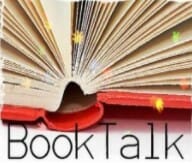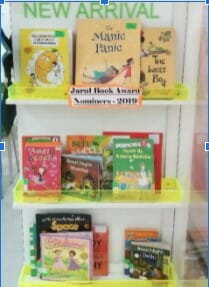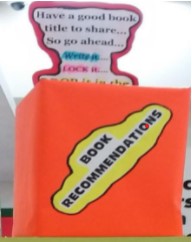“The reading of all good books is like a conversation with the finest minds of past centuries.” – René Descartes, French mathematician and philosopher.
A library is a place where ideas get exchanged between the students that give impactful learning. In my school library, some students love to read books repeatedly, some struggle to find the text of their interest, and few students do not read at all. It is always good to ask students to try different genres to develop interest. Various library activities make the library classes enjoyable. A book talk is a great way to introduce books to other readers. When asked to Grade 6, I received mixed responses. Some of them felt that book talk is the same as a book report and book review. The book talk is a presentation by a student who recommends his book to others and talks about the story’s central idea.
Here are some tips on preparing for the book talk:
There are three parts of the book talk that one should keep in mind while preparing:
- Book: Each student should talk about the book’s title, Author, and Genre of the book. If the book is a series book, then the student should also describe the other titles. The student should mention the genre of the books, whether it is adventure, mystery, fantasy, realistic, humor, science fiction, humor, etc.
- Reading out short excerpts. Students should read aloud an excerpt from the book. Students should choose the passage very carefully before doing the presentation because it needs to be exciting. Sometimes students get attracted to borrow a book based on the text read aloud by the presenter.
- A brief outline of the story: Students should talk about the main characters, setting, and the central conflict in the story very briefly. They can add the suggested reading level and the reason they chose this book for the book talk.
- Do’s & Don’ts of a Book Talk: The whole point of a Book Talk is to make others read the book you are talking about, so it’s imperative to choose a worthy book.
Secondly, select the book you have finished reading, and lastly, the book should be in your hand while doing the presentation to show the book.
Please don’t choose a book which you haven’t read, or you didn’t like.
And very IMPORTANT!
Please don’t spoil the ending and keep it short. Keeping all the points mentioned, if you haven’t done before the Book talk with your students, you probably will be doing it soon.
Work cited:
A Better World through Books. https://fortitudeandpatience.wordpress.com/. Accessed 06 September 2021
Keane, Nancy. “Booktalks — Quick and Simple. http://nancykeane.com/booktalks/default.htm/. Accessed 06 September 2021 ;Mukunda, Usha.
“The Manual for an Open School Library,” Library Educator’s Certificate course English 2018.
Thank you,
Nitu Kumari
Library Educator at The Shriram Millennium School, Noida
 ‘Book Talks’ – A quick-fire to build reading in the Primary Years.
‘Book Talks’ – A quick-fire to build reading in the Primary Years.
When you hear the word ‘talk,’ what comes to your mind is an expression of ideas, feelings, spoken words, and gestures. It is a way to convey and communicate. So when you hear the word ‘Book Talk,’ what is it that comes to your mind? Think.
In today’s world, we educators struggle to instill the love and desire for reading in our learners. Trying every single technique and taking that ‘extra’ step each time we plan our lessons so that our learners are inclined to pick up a book and read. We try all innovative ways to attract our learners to reading such as attractive organisation and genrefication of the library, read-aloud, recommendations and much more. But when it comes to picking up a book to read, children mostly rely on references from their peers.
‘Book Talk’ is one exciting activity that helps instill the love for reading and helps in the inception of passionate readers. It is a brilliant reading strategy that builds discussion and motivates the learner to pick up a particular book and READ!
What is a Book Talk?
It is an informal, short description of a particular book to influence others to pick the book and read it. It is like a short comprehension but not the entire story; instead, we can call it an elaborated, well-explained blurb. It gives an idea of the story’s plot, characters, and setting but not the main events and never the ending. In other words – No Revelations!
When planning a book talk for your class, these are the key components that one should keep in mind:
Hook: This is when the presenter holds the book facing the audience and reveals the cover page and title. Then the presenter grabs attention by announcing interesting aspects or quotes, or characters from the story while flipping through the pages. Any element that gets the audience hooked!
Content: Next comes the summary of the book. What is the book about? But like I mentioned earlier, in a book talk, one never reveals the critical events or the entire story. It’s just bits and pieces while making it enjoyable. Also, this is the part where the presenter can encourage connections with questions like ‘Have you ever come across such a person/situation in your life?’, ‘What would you do if you were in the same situation?’ Ask if anyone has read the book previously and what were their likes or dislikes in it.
Cliff hanger: Finally is the climax. The end to the discussion comes with a cliffhanger. The presenter creates a situation where they leave the audience wanting more, just like a blurb that never reveals the end! This is the stage where the presenter can leave the discussion open-ended with predictions coming in. Remember – there is no right or wrong here! Then leave the book for your learners to explore. Make sure you have a couple of copies available already.
Finally, once your learners get the hang of conducting a book talk, you can build different ways/approaches or assignments and get them doing their little book talk on the title they love or pick.
Besides the usual weekly/monthly book talks, I practice the following encouraging ‘Book Talks’ in my library.
 ‘The Review Crew’: I have placed a ‘New Arrival’ shelf at the entrance of my library, where I display a few newly procured books (which have not acclaimed a position on the shelf yet). The learners are free to volunteer to be a part of the ‘Review Crew’ and pick any book from that shelf for a Book Talk. This, in a way, also gives them the voice, choice, and ownership to decide on what they want to read and present. On volunteering for this task, they receive a ‘Review Crew’ badge which they wear until the presentation. Once they select a book, I give them a week to read the same, after which they present it as a book talk to the entire class keeping in mind the ‘key components’ mentioned above. Once the book talk is completed the audience learners can reserve the book for their reading for the coming weeks. My learners have shown great interest in this activity and thoroughly enjoy this process. Also, I’ve visibly seen the rise in ‘non-readers’ getting excited and wanting to read the new book and participate in the book talk as a presenter.
‘The Review Crew’: I have placed a ‘New Arrival’ shelf at the entrance of my library, where I display a few newly procured books (which have not acclaimed a position on the shelf yet). The learners are free to volunteer to be a part of the ‘Review Crew’ and pick any book from that shelf for a Book Talk. This, in a way, also gives them the voice, choice, and ownership to decide on what they want to read and present. On volunteering for this task, they receive a ‘Review Crew’ badge which they wear until the presentation. Once they select a book, I give them a week to read the same, after which they present it as a book talk to the entire class keeping in mind the ‘key components’ mentioned above. Once the book talk is completed the audience learners can reserve the book for their reading for the coming weeks. My learners have shown great interest in this activity and thoroughly enjoy this process. Also, I’ve visibly seen the rise in ‘non-readers’ getting excited and wanting to read the new book and participate in the book talk as a presenter.



Another approach that I use to encourage book talks is ‘Recommendations.’ I’ve placed an attractive ‘Recommendation Box’ on my desk in my library. The learners are free to put their book recommendations in that box. After going through the book details carefully, I buy them if they are age and content-appropriate. Once the recommended book arrives, the learner who had recommended the particular book gets an opportunity to present a book talk to the class. Sometimes, I even call them to give it to other classes (which boosts their communication skills and confidence). Once the learner completes the book talk, the other learners can reserve the book for their reading. The learner recommendation that receives the maximum amount of reservations receives a ‘Book Explorer’ certificate. This highly motivates other learners not only to put in their suggestions but also to present them to an audience.
Why are book talks significant?
- Reading is contagious, and peers are the real idols and motivators for children! When children know that their peers are reading a particular book they’ve not read, they get intrigued to read the same.
- It builds communication skills. Talking/speaking can sometimes be a big challenge for primary year’s learners. Book talks not only allow them to communicate it also boost one’s confidence.
- It also promotes a lot of inquiry in a classroom. If the presentation is interesting, the audience participates in a discussion and starts to ask questions.
- Learners are exposed to a variety of genres and authors, and even languages.
- Finally, it is a stepping stone towards building comprehension skills as well as persuasive writing skills.
Some supportive tips for a successful book talk:
- Must be short and crisp. Not too long as it should hold the attention of the audience throughout.
- Must select an age and content-appropriate book (the teacher-librarian can be the guide here).
- They must have finished reading the book themselves before presenting it to the class.
- An interesting quote, event or illustration must be shared from the book.
- Discussions should be initiated, building connections and making predictions as it builds interest and curiosity.
- Must give valid reasons as to WHY the audience should pick up the particular book and read BUT without revelations!
- When giving a book talk on non-fiction books, the presenter can share one or two exciting facts or demonstrate the skills they have learned from the book.
- Must have captivating presentation skills – good eye contact, loud and clear voice, clear diction, confidence, and above all enthusiasm to persuade the audience to get ‘HOOKED’ onto the book.
 Above all these, the most motivating way to encourage book talks is to ‘model the process.’ Share your favourite books and do regular read-aloud activities to help the learners with presentation skills (volume, clarity, speed, persuasive language, grammar, etc.). Also, I would strongly recommend having guest speakers in your class to give book talks about their favourite books. When I say guest speakers, I mean authors or English department faculty, present teachers from various departments and languages such as P.E, ESL, Hindi, and Marathi, and let them share their book talk. This not only encourages open-mindedness but also builds interest in reading different languages.
Above all these, the most motivating way to encourage book talks is to ‘model the process.’ Share your favourite books and do regular read-aloud activities to help the learners with presentation skills (volume, clarity, speed, persuasive language, grammar, etc.). Also, I would strongly recommend having guest speakers in your class to give book talks about their favourite books. When I say guest speakers, I mean authors or English department faculty, present teachers from various departments and languages such as P.E, ESL, Hindi, and Marathi, and let them share their book talk. This not only encourages open-mindedness but also builds interest in reading different languages.
Book talks are an exciting and informal way that introduces children to a variety of books that they will want to read. And like the famous quote says…
“Reading should not be presented to children as a chore, a duty. It should be offered as a gift.” – Kate DiCamillo.
Please check out this fantastic resource to help you plan a lesson on book talks for your primary learners. Do explore the website in detail for some brilliant ideas and recommendations on book talks for primary learners.
You can also view this short video, ‘Build better book talks’, which provides tips for book talking to primary learners by Dr. Brad Gustafson.

